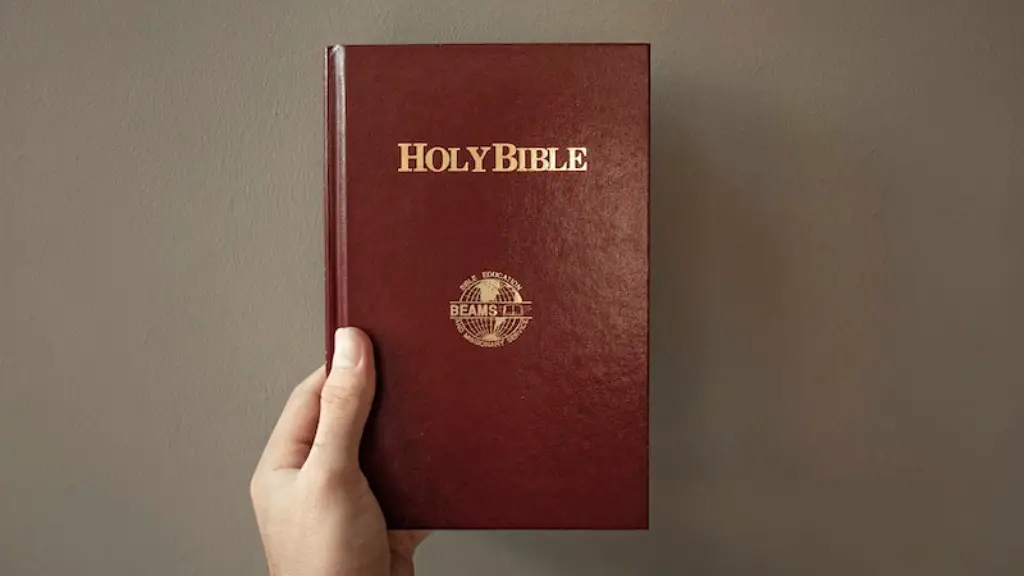Summary of Contents
This article discusses the differences between the Quran and the Bible. It provides background information on both religious texts, relevant data and perspectives from experts. It also includes insights into the history and purpose of each text, as well as analysis of their similarities and differences. The article expands upon this topic in further sections, exploring the role of religious leaders in each religion, their approaches to interpretations of the texts, and how the texts have been used to shape society.
Background and Summary of the Bible and Quran
The Bible and the Quran are two of the most influential religious texts in the world. Both documents have been revered by followers of their respective faiths over centuries. The Bible is comprised of 66 books, written by different authors over the course of more than 1,500 years. It is primarily written in Hebrew and Greek, with minor sections in Aramaic. Most Christians consider the entire collection of books to be the inspired word of God, and it serves as the foundational book for Christianity. The Quran is the central religious text of Islam, and it is believed by Muslims to be essentially a revelation from God as given to the Prophet Muhammad. The Quran has 114 chapters, and is generally composed in Arabic.
Each text is integral to its respective religion, and the teachings and values contained in the texts influence both individuals and societies. While there are some similarities between the Quran and Bible, the differences between the documents sets them apart. These differences can be observed in their historical context, language, conceptualization of God, and their approach to diverse topics such as death, medicines and salvation.
Historical Context
The Bible and the Quran are both products of their respective historical era and are shaped heavily by the events, ideas and values of the time. The Bible consists of ancient Hebrew scriptures that were compiled over centuries, culminating in its final form in the 7th-15th centuries. During those times, the world was divided into many separate, independent societies, and each book of the Bible reflects this evolution. Meanwhile, the Quran was compiled in the 7th century A.D. during the rise of Islam. The Quran reflects the changing political and social landscape of the times, and is shaped by the culture and values of the era.
Both texts have been adapted and translated over the years to meet the changing needs of society. For example, the Bible has been translated into almost every language and its teachings interpreted differently in different cultures. Similarly, the Quran has been translated into multiple languages and has evolved to accommodate different views and interpretations.
Language
The language used in the Bible and the Quran differs considerably. The Bible is written in a combination of languages, including Hebrew, Greek and Aramaic, whereas the Quran is composed entirely in Arabic. Some argue that the differences in language make it difficult to compare the two texts accurately. Most of the Bible’s translations were done in the 19th century, whereas many Quranic translations have been done in modern times. Hence, the translations of the Bible lack the cultural context and nuances of the Quran, making it more difficult to accurately convey the message of the text
The language in the Bible and Quran also reflects the values of the societies that produced them. For example, the Bible uses masculine language to refer to God, while the Quran replaces masculine language and instead uses terms such as “lord” and “owner”. This further displays how each text is strongly shaped by its respective culture.
Conceptualization of God
The way God is conceived of and portrayed in both the Bible and the Quran is also significantly different. While both documents depict God as the creator and ruler, there are major differences in the descriptions of His nature. The Bible presents God as a God of justice and wrath, while the Quran presents a more compassionate, forgiving God. This difference is reflected in their teachings and treatment of sin. The Bible outlines a complex system of laws and punishments, while the Quran emphasizes the importance of repentance and forgiveness.
The Bible is often seen as emphasizing obedience to God’s commands, while the Quran is more focused on understanding God’s will and following the path of righteousness. The Bible also tends to portray God as a distant, abstract force, whereas the Quran emphasizes the fact that God is closer to humans and desires that they strive for a spiritual relationship with Him.
Death & Punishments
Death and punishments are important topics that are addressed differently in the Bible and Quran. The Bible outlines a number of detailed laws and punishments for various offenses, whereas the Quran generally suggests that offenders are put on trial and a punishment is then determined by the judge. This reflects the different attitudes towards sin and justice from the two texts. The Quran also outlines the concept of ‘divine justice’, which emphasizes the importance of divine rather than human judgement.
The Bible and Quran also give different perspectives on death. While the Bible tends to emphasize the mortality of human life, it also suggests that there is something beyond death that humans must strive toward. The Quran is more focused on life in the here and now, suggesting that humans can only judge one another based on their actions in this human life.
Medicines and Health Practices
The Bible and Quran offer different approaches to health and medicines. The Bible provides detailed instructions on health practices, such as the foods people should eat, how to treat diseases, and how to purify water. On the other hand, the Quran contains very few instructions on health practices and does not specify any particular remedies for sickness. Instead, it emphasizes the importance of seeking advice from qualified medical professionals for treatment of any diseases or ailments.
The Bible also contains more detailed instructions on diet, whereas the Quran merely suggests that Muslims should have a balanced diet. The Quran is also the only religious text to explicitly forbid the use of intoxicants, while the Bible merely discourages the use of such substances. This further displays the differences between the two texts in approach to health and medicine.
Salvation and Beliefs
Beliefs about salvation are another major difference between the Bible and the Quran. The Bible outlines a complex belief system in which people must accept certain beliefs about Jesus and his teachings in order to be saved. On the other hand, the Quran does not focus on belief as a means of salvation and instead emphasizes the importance of human action. It suggests that those who live their lives with good deeds and kindness will gain the reward of paradise.
The Bible also emphasizes the importance of faith in Jesus, while the Quran emphasizes the importance of submission to God and following his teachings. The Bible’s focus on faith is also reflected in its approach to the afterlife, suggesting that those who believe will go to heaven after death, while those who do not have faith are condemned to damnation.
Religious Leaders and Interpretations
Religious leaders and the way they interpret each text can also be a factor in their differences. In Christianity, religious leaders have traditionally interpreted the Bible as a literal and inerrant document. This has resulted in a single unified interpretation of the text that focuses on adhering to strict rules and teachings. In contrast, Islamic scholars have taken a more nuanced approach to interpreting the Quran, often looking at interpretations from different perspectives and a range of ideologies.
The interpretation of the texts is also shaped by the beliefs of their respective religions. Christianity is focused on worshipping Jesus as a Son of God, while Islam emphasizes the importance of submission to one God and following his teachings. These interpretations lead to drastically different outcomes in their approaches to both everyday life and the afterlife.
Impact on Society and Cultural Values
The differing views outlined in the Bible and the Quran have had a significant impact on religious and social values in their respective societies. The Bible has shaped the beliefs of many Western societies, while the Quran has shaped the moral foundations of much of the Muslim world. These texts also offer different approaches to societal values and norms, with the Bible emphasizing obedience to God’s laws and prohibitions, while the Quran encourages freedom of thought and respect for all people, regardless of beliefs.
Both texts have also been used over the centuries to shape power dynamics and social hierarchies in their respective societies. The Bible has been used to justify slavery, colonization and discrimination against ethnic and gender minorities, while the Quran has been used as a tool to promote equality and justice. Both God and government have been invoked to enforce laws and rules based on the teachings of these texts.
Conclusion of the Bible versus Quran
The difference between the Bible and the Quran can be observed in their language, historical context, conceptualization of God and approach to topics such as death, medicine and salvation. Each document speaks to the values and beliefs of its respective faiths, and shapes the moral and social values of society. They both contain a wealth of knowledge and offer valuable insight into how religions have shaped the world today.





